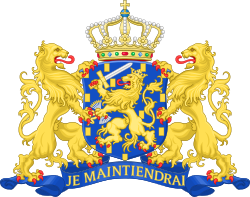1815 to 1887
The House of Representatives of the Netherlands was established in 1815 when the United Kingdom of the Netherlands was created. Initially it consisted of 110 members, elected by the provincial councils. Members served a three-year term, with one third of the seats up for election each year. In 1830, the southern provinces declared their independence in the Belgian Revolution, to become Belgium. Initially the Netherlands did not recognise this, but the 55 seats in the House of Representatives representing these provinces remained vacant, so the de facto membership was reduced to 55 members. [1] After the Treaty of London in 1839, the Dutch government recognised the separation of Belgium, and became the Kingdom of the Netherlands. In 1840 the constitution was changed; all southern provinces except the eastern half of the province of Limburg (with three representatives) had left the Kingdom of the Netherlands, so the size of the House of Representatives was fixed at 58 members. [1]
The Constitutional Reform of 1848 resulted in direct elections to the House of Representatives. Members served a four-year term, with half of the seats up for election every two years. [2] The total membership was set at one member for each 45000 Dutch citizens; [3] so the house increased to 68 members; in 1859 it grew further to 72 members. [1]
This page is based on this
Wikipedia article Text is available under the
CC BY-SA 4.0 license; additional terms may apply.
Images, videos and audio are available under their respective licenses.
